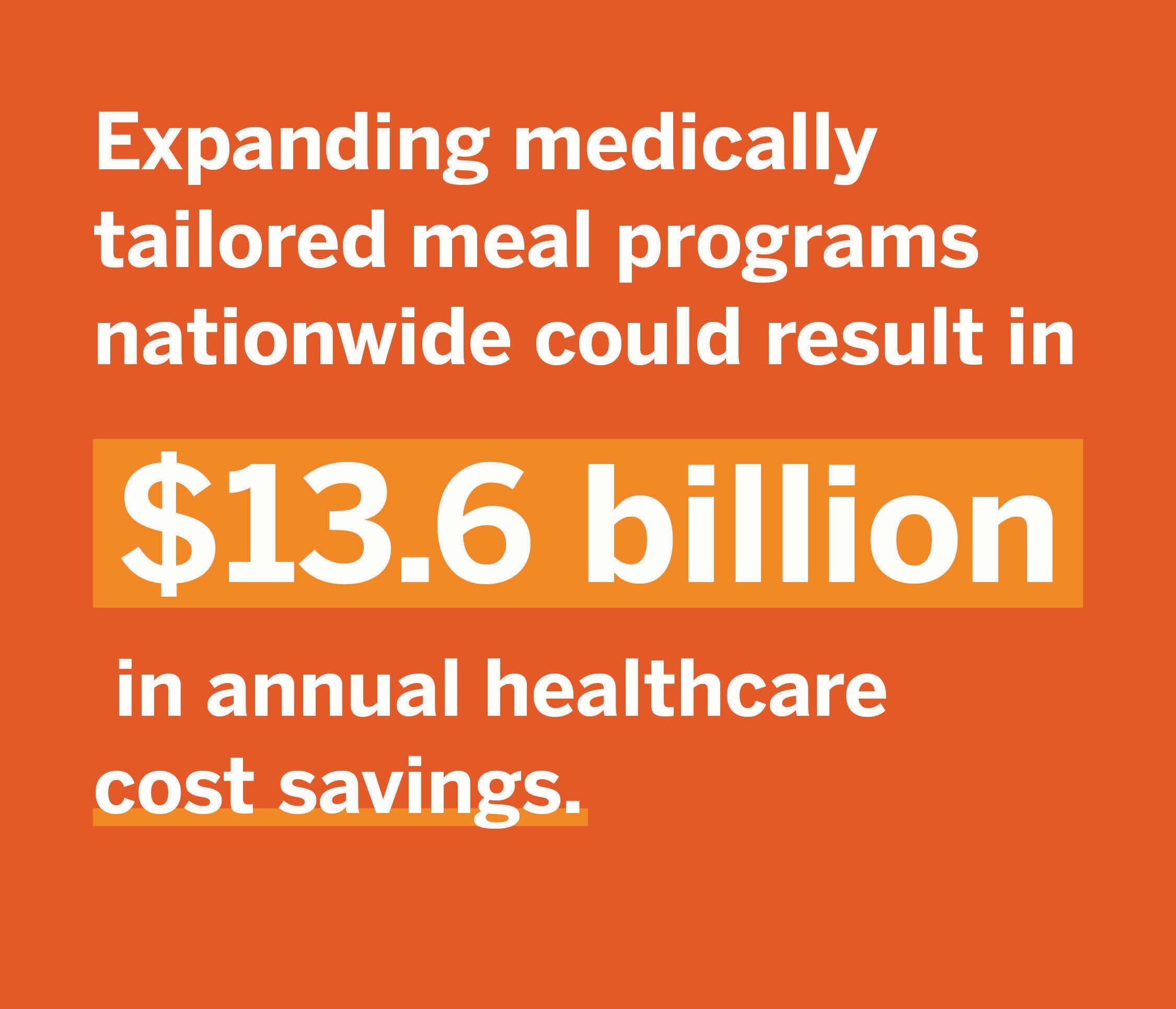In April 2025, the AMPL Institute at Community Servings released its first comprehensive report on recent advances in access to life-saving, medically tailored nutrition services. The report also assessed the prospects for further momentum within the healthcare system and the rapidly shifting federal policy and funding landscape.
READ THE REPORTCommunity Servings’ peer-reviewed research has supported innovations in public policy and new opportunities for the reimbursement of nutrition services within healthcare.
Past evaluation of the health and economic benefits of medically tailored meals (MTM) found that for individuals with complex chronic illnesses and nutrition insecurity, MTM improves dietary quality, reduces healthcare utilization, and reduces costs.

People who received MTM demonstrated:
People with diabetes who received MTM demonstrated:
In collaboration with the University of North Carolina School of Medicine, Community Servings has recruited 100 individuals with a chronic cardiometabolic condition to test the “target” of the intervention (i.e., individual vs. household) and the delivery mechanism (i.e., shipped vs. delivered by a Community Servings driver).
Community Servings is currently collaborating on three studies funded by the NIH.
Evaluation Consortium
In collaboration with the Tufts University Food is Medicine Institute and University of Massachusetts Medical School, Community Servings is examining the impacts of medically tailored meals (MTM) on obesity, diabetes control, blood pressure, healthcare cost, and healthcare utilization under the MassHealth (Medicaid) Flexible Services Program.
This is a claims data study evaluating the impact of MTM on over 5,000 individuals receiving the service.
Food As Medicine for Diabetes
In collaboration with University of North Carolina at Chapel Hill Medical School and Massachusetts General Hospital, Community Servings is examining the impacts of increased food access on improving health outcomes for individuals living with type 2 diabetes and food insecurity.
Food As Medicine for
HIV and Diabetes
In collaboration with University of North Carolina at Chapel Hill Medical School and Massachusetts General Hospital, Community Servings is examining the impacts of increased food access and a lifestyle intervention on improving health outcomes for individuals living with HIV, type 2 diabetes, and food insecurity.
In collaboration with the Center for Nutrition & Health Impact, the Center for Health Law and Policy Innovation of Harvard Law School (CHLPI), and Johnson & Wales University, Community Servings is developing a report and supporting evaluation and educational tools documenting Community Servings’ practices of sourcing foods from local farms, fisheries, and other producers.
Medically Tailored Grocery Box Pilot Project
In collaboration with the Center for Health Law and Policy Innovation of Harvard Law School and the University of Massachusetts Medical School, Community Servings will recruit 50-55 Central Massachusetts residents with chronic or critical illnesses and provide 12 biweekly home-delivered food boxes, including ingredients for 20 meals and nutrition education. The pilot leverages Central Massachusetts’ agricultural resources, integrates local food sourcing, and builds on Community Servings’ extensive research demonstrating the effectiveness of MTMs.
2024 Food is Medicine Research Action Plan
Hager K, Kummer C, Lewin-Zwerdling A, Zhongyu L.
Food & Society at the Aspen Institute (2024)
Food is Medicine Fact Sheet
Tufts Food is Medicine Institute.
True Cost of Food: Food is Medicine Case Study.
Deuman KA, Callahan EA, Wang L, Mozaffarian D.
Food is Medicine Institute, Friedman School, Tufts University (2023)
Food Is Medicine Federal Resource Hub. Office of Disease Prevention and Health Promotion, U.S. Department of Health & Human Services.
“Association Between Receipt of a Medically Tailored Meal Program and Health Care Use.” Berkowitz et al. JAMA Internal Medicine (2019)
“Association of National Expansion of Insurance Coverage of Medically Tailored Meals with Estimated Hospitalizations and Health Care Expenditures in the US.”
Hager, K et al. JAMA Network Open (2022)
“Meal Delivery Programs Reduce the Use of Costly Health Care in Dually Eligible Medicare and Medicaid Beneficiaries.” Berkowitz et al. Health Affairs (2018)
“Medically Tailored Meal Delivery for Diabetes Patients with Food Insecurity: A Randomized Cross-over Trial.” Berkowitz et al. Journal of General Internal Medicine (2019)
“’I Was Able to Eat What I Am Supposed to Eat’ ”– Patient Reflections on a Medically Tailored Meal Intervention: A Qualitative Analysis.”
Berkowitz et al. BMC Endocrine Disorders (2020)
Doctoring Our Diet II: Nutrition Education for Physicians Is Overdue. Food Law and Policy Clinic, Harvard Law School (2024)
“Proposed Nutrition Competencies for Medical Students and Physician Trainees: A Consensus Statement.”
Eisenberg, D et al. JAMA Network Open (2024)
“Applying Legal and Clinical Quality Standards to ‘Food Is Medicine.’” Hanson E et al. Health Affairs Forefront (2024)
“The Evolution and Scope of Medicaid Section 1115
Demonstrations to Address Nutrition: A US Survey.”
Hanson, E et al. Health Affairs Scholar (2024)
Food is Medicine: A State Medicaid Policy Toolkit. Center for Health Law and Policy Innovation & the Food is Medicine Coalition (2024)
Massachusetts Food is Medicine State Plan. Center for Health Law and Policy Innovation of Harvard Law School & Community Servings (2019)
Medicaid Federal Policy Guidance. Centers for Medicare & Medicaid Services.